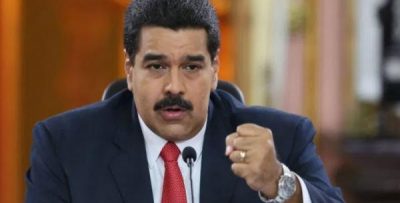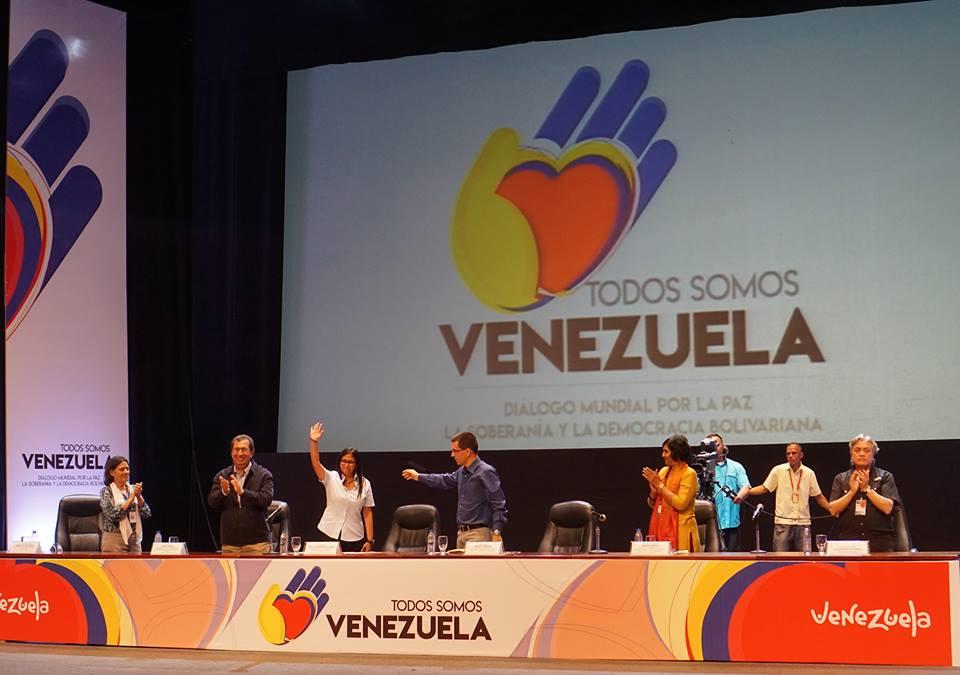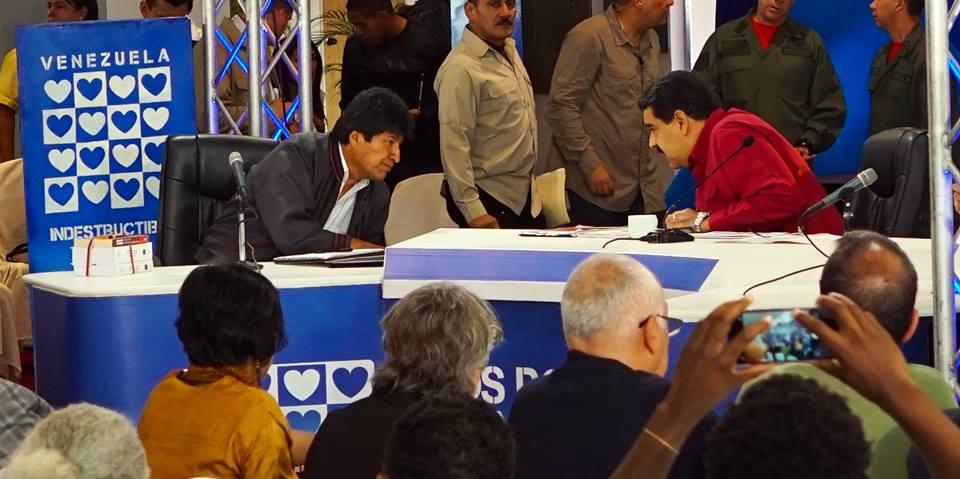Venezuela Wants Peace, Sovereignty and Bolivarian Democracy

During four days, September 16-19, I was in Caracas, Venezuela, as one of more than 200 delegates from 60 countries who responded to an invitation to attend the international solidarity meeting “Todos Somos Venezuela – Dialogo Mundial por la Paz, la Soberania y la Democracia Bolivariana” (We Are All Venezuela – World Dialogue for Peace, Sovereignty and Bolivarian Democracy). There were delegates representing political, social, religious and trade union organizations. I was representing the Canadian organization Frente para la Defensa de los Pueblos Hugo Chavez and I was one of seven Canadians.
We had an opportunity to hear from, and exchange with, people from the Venezuelan administration. Among them: President Nicolas Maduro, Jorge Arreaza, Minister of Foreign Relations, Delcy Rodriguez, former Minister of Foreign Relations and current President of the National Constituent Assembly, and Adan Chavez, brother of Hugo Chavez, the International Coordinator of the United Venezuelan Socialist Party (PSUV).
Among the international delegates Evo Morales, President of Bolivia, shared his country’s undivided solidarity with Maduro. Other delegates were Fernando Gonzalez, former “Cuban Five” prisoner and President of the Cuban Institute for Friendship with the Peoples, Maria do Socorro Gomes, president of the World Peace Council, the son of murdered President Patrice Lumumba, from Congo, and a Palestinian delegate whose words made us all rise to a standing ovation of solidarity.
Why such urgency and such a wide call to an international meeting in Caracas?
There is a concerted plan by the U.S. government to overthrow President Maduro and to completely wipe out the Bolivarian Revolution and the governing party the Partido Socialista Unido de Venezuela (PSUV, United Socialist Party of Venezuela). The first attempt was the failed coup against Chavez in 2002. Then there have been attempts through parliamentary coups and referendums to remove the president “constitutionally”.
Failing all of that, the level of violence, orchestrated by the rightwing Venezuelan opposition, increased reaching a peak in April-July of this year with more than 120 Venezuelans killed, some burned alive as suspected Chavistas. This tactic of extreme violence was used in order to destabilize the country and reach international visibility, with the aid of corporate media, setting up the perfect pretext for the U.S. government to justify any kind of intrusion in the name of the “poor suffering” Venezuelan people.
Source: Nino Pagliccia
Following U.S. threats of military intervention and escalating sanctions, the violence has subsided and the last round of sanctions were applied on August 25. This amounted to a virtual financial blockade that prevents Venezuela from having access to international financing necessary for its oil industry. To this Venezuela has responded by dropping the petrodollar and peg the oil trade to the Chinese Yuan.
Regrettably but not surprisingly, Canada has recently joined the U.S. in applying sanctions to 40 high-ranking Venezuelans including President Nicolas Maduro.
There is no denial that the attack on Venezuela comes from governments that want to strangle the Venezuelan economy for the purpose of regime change. Delcy Rodriguez stated in Caracas,
“Venezuela is the victim of a non conventional war”, and she reminded us of the case of Iraq, Libya and Syria.
That is why international solidarity is necessary and hence the call to the meeting “Todos Somos Venezuela” in Caracas.
The message throughout the four days of discussions and planning on how to break the corporate media silence – indeed disinformation – about Venezuela, was loud and clear: Venezuela wants peace, sovereignty and Bolivarian democracy.
Venezuela’s peace has been shattered by what was called “four months of fascist violence” to which, in the words of Venezuelan Foreign Minister Jorge Arreaza, “instead of appealing to repression, Maduro appealed to the Constituent Assembly.”
In fact, while the formal goal of the Constituent Assembly is to present a new constitution to the people of Venezuela to be voted on, perhaps the most meaningful goal is to bring together the population to discuss solutions to the common issues they face, and with it bring peace to the country. It is an opportunity that the Venezuelan opposition has stubbornly refused to give it a chance.
It is unfortunate that rightwing countries that usually profess the importance of democracy, side with the opposition and fail to recognize the significance of this popular participatory process that the Constituent Assembly provides in Venezuela.
While the U.S. promotes a “worn out model” of democracy based on a confrontational process, Venezuela (and Cuba before that) attempts to build a “new value system and a new model of democracy” – Bolivarian democracy – from the roots up based on a constant participatory process where no one is left out, except those who choose not to be part of it.
In the last 18 years Venezuela has had 21 democratic elections and it is preparing for the 22nd election on October 15 when Venezuelans will vote for 23 state governors in more than 13,000 polling stations and with the support of the Council of Electoral Experts of Latin America, which will send 50 international election experts to observe the electoral process. At the time of writing all major opposition parties appear to be willing to participate in the elections in what seems to be an acceptance of Maduro’s persistent invitation to dialogue.
On the last day of the meeting an “anti-imperialist” march, where all delegates participated ending at a mass gathering in front of the presidential office of Miraflores, gave us all an opportunity to hear Maduro’s final call to peace – “Este es un pueblo de paz” (“This is a people of peace”) – and his warning that a threat of military action against Venezuela “is a threat to the whole world.”
Source: Nino Pagliccia
This was not an ordinary meeting. This was not an occasion for a photo op to be seen with famous Venezuelan and international delegates. This was much more than an occasion to express our solidarity. This was an urgent call from Venezuela to the world asking to roll up our sleeves and work alongside the Venezuelan people anywhere we live to defend the Bolivarian Revolution. That part of the world represented by the 200 delegates responded by issuing a detailed work plan with a commitment to promote the peaceful and democratic electoral process of October 15, among other actions.
Featured image is from Zero Hedge.



